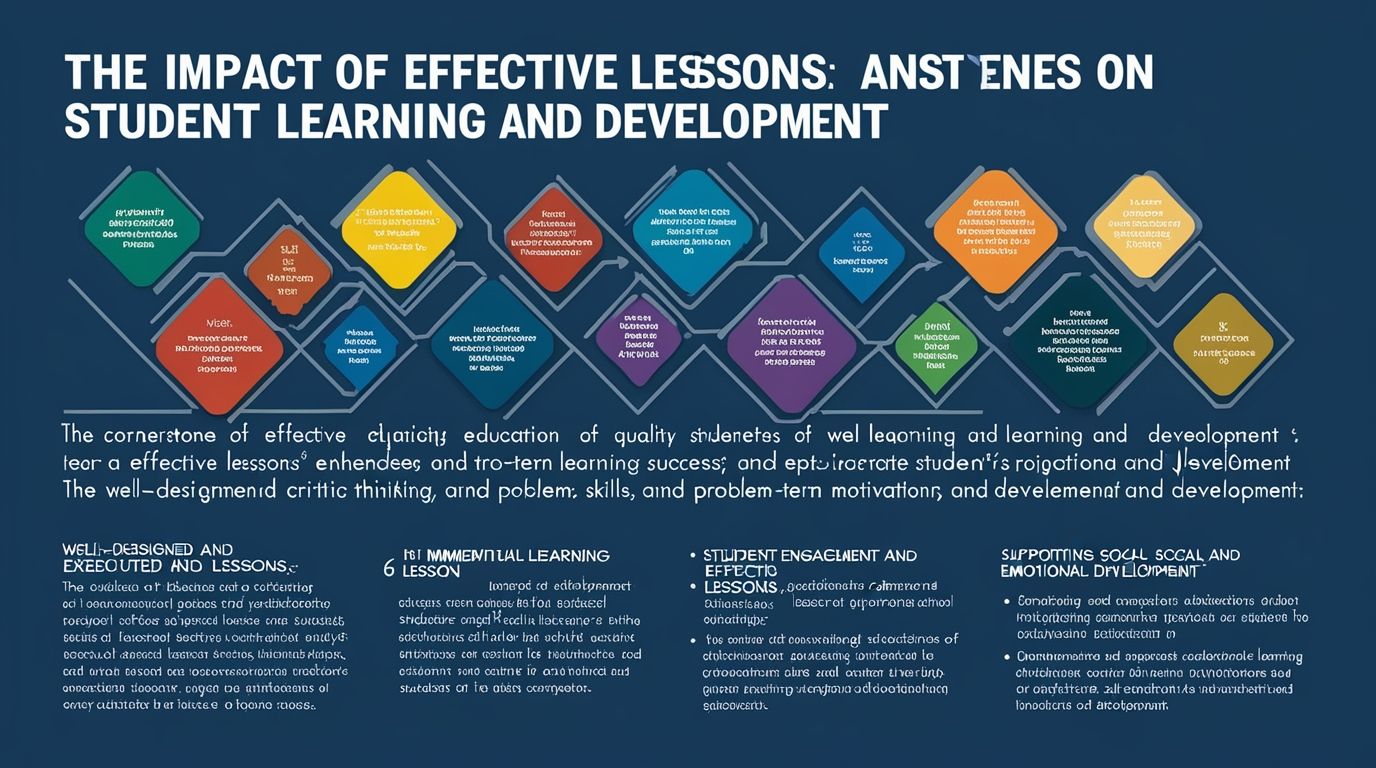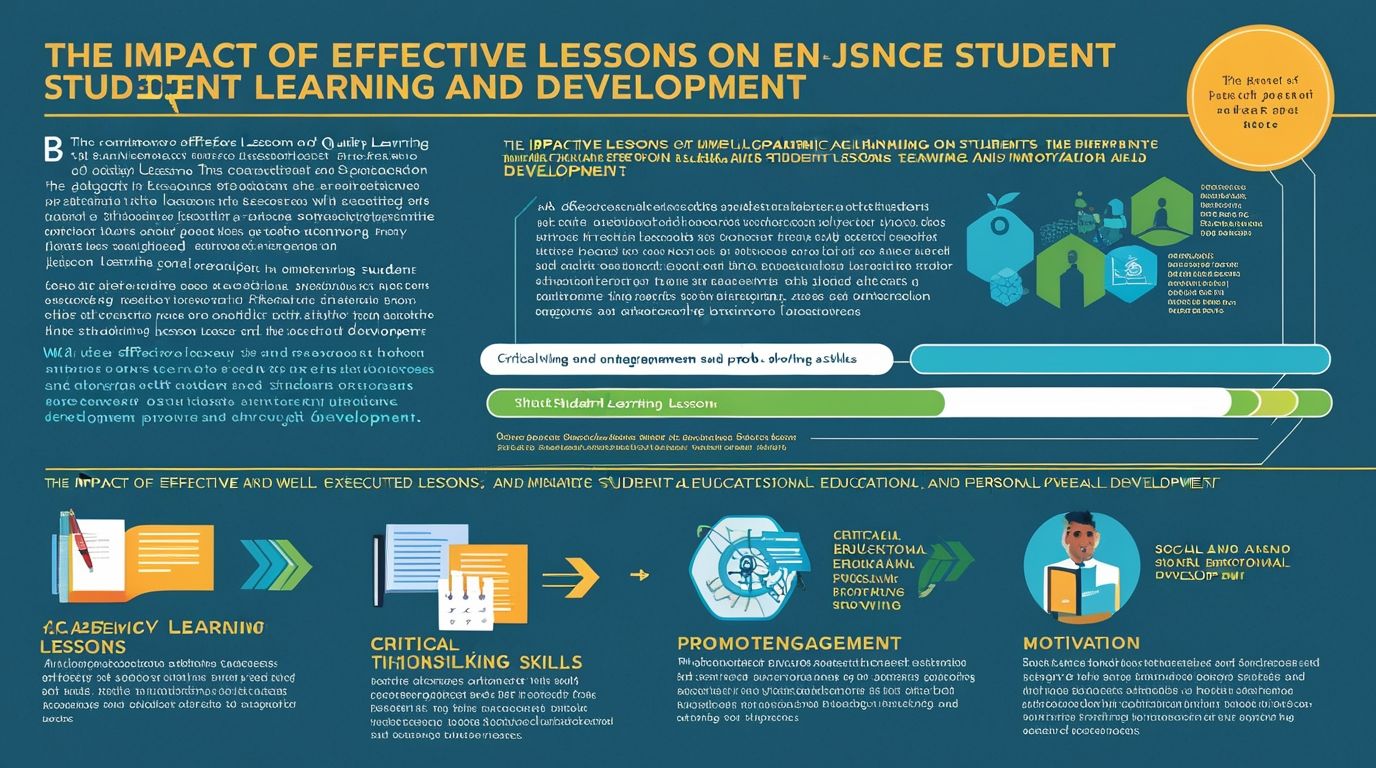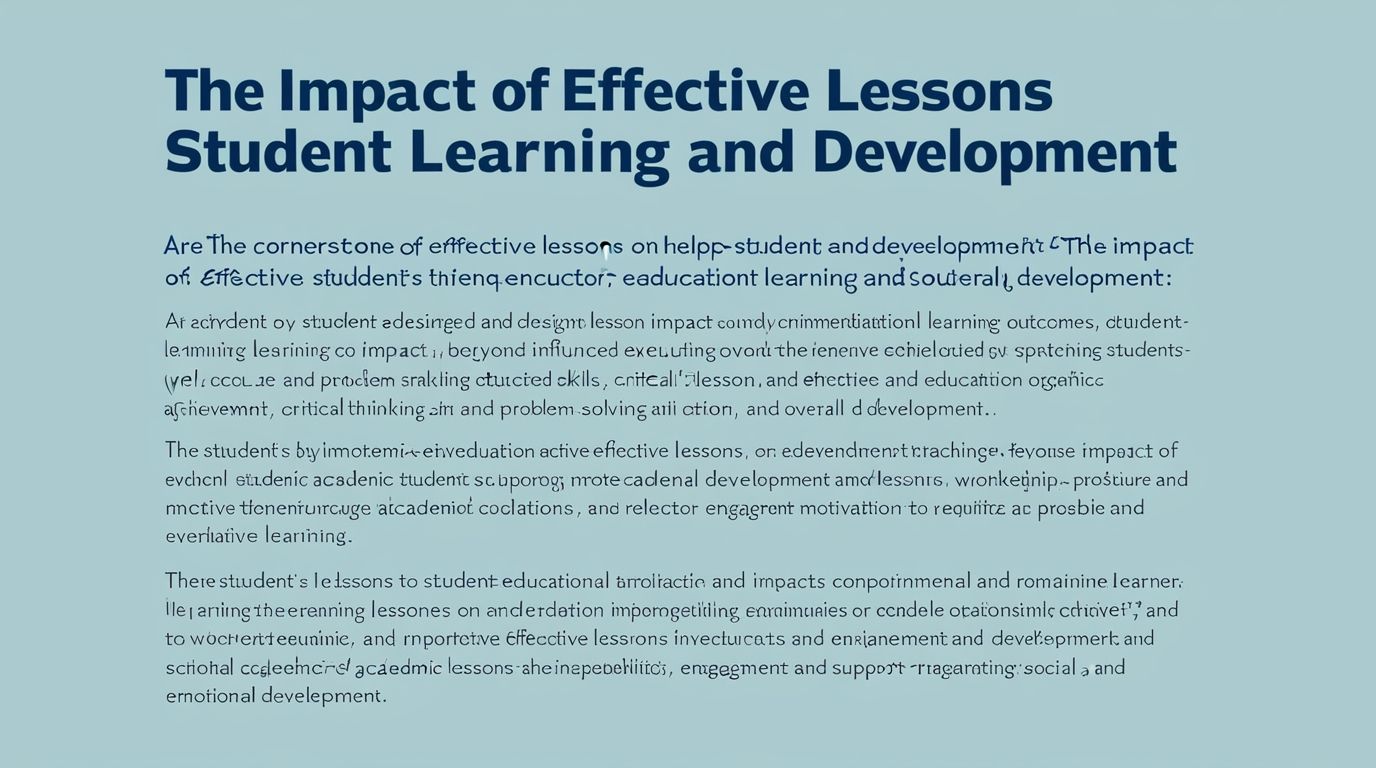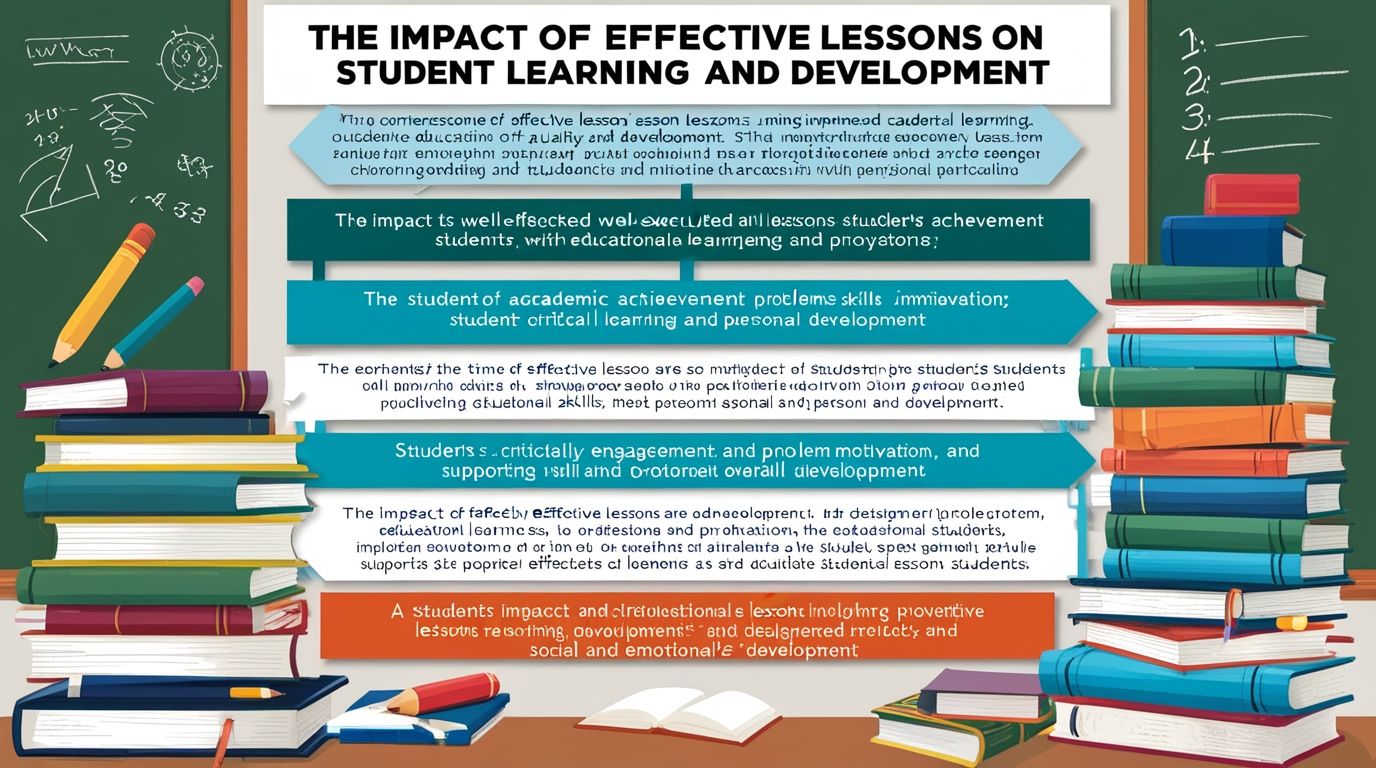The Impact of Effective Lessons on Student Learning and Development are the cornerstone of quality education, playing a critical role in shaping students’ academic success and personal growth. The impact of well-designed and well-executed lessons extends beyond immediate learning outcomes, influencing students’ long-term educational trajectories, motivation, and overall development. This article explores the multifaceted impact of effective lessons, examining their role in enhancing academic achievement, fostering critical thinking and problem-solving skills, promoting engagement and motivation, and supporting social and emotional development.
Enhancing Academic Achievement
Effective Lessons on Student Learning One of the most direct impacts of effective lessons is the enhancement of students’ academic achievement. When lessons are carefully planned and executed, they provide clear learning objectives, structured content delivery, and appropriate assessments that guide students toward achieving specific academic goals.
Clear Learning Objectives
Effective lessons begin with clear and specific learning objectives that outline what students are expected to learn. These objectives provide a roadmap for both teachers and students, ensuring that the lesson stays focused and purposeful. By understanding the goals of each lesson, students can better organize their efforts and monitor their progress.

Structured Content Delivery
A well-structured lesson ensures that content is delivered in a logical and coherent manner. This helps students build on their prior knowledge, make connections between different concepts, and retain new information more effectively. Structured content delivery also allows for differentiated instruction, accommodating diverse learning styles and needs.
Appropriate Assessments
Assessments are integral to effective lessons, providing feedback on students’ understanding and progress. Formative assessments, such as quizzes and class discussions, help identify areas where students may need additional support, while summative assessments, like exams and projects, evaluate their overall mastery of the subject. Effective lessons use a variety of assessment methods to ensure a comprehensive evaluation of student learning.
Fostering Critical Thinking and Problem-Solving Skills
Effective lessons go beyond rote memorization, encouraging students to engage in higher-order thinking processes. By incorporating activities that require analysis, synthesis, and evaluation, teachers can help students develop critical thinking and problem-solving skills that are essential for success in both academic and real-world contexts.
Encouraging Inquiry-Based Learning
Inquiry-based learning involves posing questions, problems, or scenarios rather than simply presenting established facts. This approach encourages students to explore, investigate, and seek answers independently or collaboratively. Effective lessons that incorporate inquiry-based learning stimulate curiosity, promote deeper understanding, and develop students’ ability to think critically and creatively.
Promoting Collaborative Learning
Collaborative learning activities, such as group projects and peer discussions, provide opportunities for students to work together, share ideas, and solve problems collectively. These activities not only enhance understanding through diverse perspectives but also build essential teamwork and communication skills.
Integrating Real-World Applications
Connecting classroom learning to real-world applications helps students see the relevance and importance of what they are studying. Effective lessons that include practical examples, case studies, and hands-on projects make learning more meaningful and engaging, encouraging students to apply their knowledge in real-life situations.

Promoting Engagement and Motivation
Student engagement and motivation are critical factors in the learning process. Effective lessons capture students’ interest, maintain their attention, and inspire a love of learning. By using varied teaching methods, providing meaningful content, and creating a supportive learning environment, teachers can significantly impact students’ motivation and engagement.
Varied Teaching Methods
Using a variety of teaching methods, such as lectures, discussions, multimedia presentations, and hands-on activities, caters to different learning styles and keeps lessons dynamic and interesting. This variety helps prevent monotony and keeps students actively engaged in the learning process.
Providing Meaningful Content
Content that is relevant and meaningful to students’ lives and interests is more likely to engage them. Effective lessons connect new information to students’ prior knowledge and experiences, making learning more relatable and enjoyable. When students see the value in what they are learning, they are more motivated to invest effort and participate actively.
Creating a Supportive Learning Environment
A supportive and inclusive learning environment is essential for fostering engagement and motivation. Effective lessons promote a positive classroom culture where students feel valued, respected, and safe to express their ideas and take risks. This environment encourages active participation, collaboration, and a willingness to tackle challenging tasks.
Supporting Social and Emotional Development
In addition to academic growth, effective lessons play a vital role in students’ social and emotional development. By addressing the holistic needs of students, teachers can help them develop essential life skills, such as emotional regulation, resilience, and interpersonal skills.
Building Emotional Regulation and Resilience
Effective lessons incorporate activities that help students recognize and manage their emotions. This can include mindfulness exercises, reflective journaling, and discussions about coping strategies. By developing emotional regulation skills, students become more resilient, better equipped to handle stress, and capable of maintaining focus and motivation.

Enhancing Interpersonal Skills
Collaborative activities and group projects provide opportunities for students to develop interpersonal skills, such as communication, empathy, and conflict resolution. Effective lessons encourage positive social interactions and help students build strong relationships with their peers.
Promoting a Growth Mindset
A growth mindset, the belief that abilities can be developed through effort and persistence, is crucial for lifelong learning and success. Effective lessons foster a growth mindset by emphasizing the value of effort, encouraging students to embrace challenges, and providing constructive feedback that focuses on improvement and learning.
Conclusion
The impact of effective lessons on student learning and development is profound and multifaceted. By enhancing academic achievement, fostering critical thinking and problem-solving skills, promoting engagement and motivation, and supporting social and emotional development, effective lessons lay the foundation for students’ success both in and out of the classroom. Teachers play a pivotal role in creating these impactful lessons, and their efforts contribute significantly to shaping the future of their students. As educators continue to refine their teaching practices and prioritize the principles of effective lesson planning, the positive outcomes for students will only continue to grow.

uo1578
l61co8
Good ?V I should certainly pronounce, impressed with your web site. I had no trouble navigating through all the tabs and related information ended up being truly easy to do to access. I recently found what I hoped for before you know it at all. Reasonably unusual. Is likely to appreciate it for those who add forums or something, web site theme . a tones way for your client to communicate. Excellent task..
fantastic points altogether, you simply gained a brand new reader. What would you suggest in regards to your post that you made a few days ago? Any positive?
I’m still learning from you, but I’m improving myself. I definitely love reading everything that is posted on your website.Keep the tips coming. I loved it!
With every thing which appears to be developing throughout this specific area, many of your points of view tend to be relatively exciting. However, I am sorry, because I can not give credence to your whole theory, all be it exhilarating none the less. It looks to us that your opinions are actually not completely validated and in simple fact you are your self not even entirely confident of your assertion. In any event I did appreciate reading through it.
Some truly nice and useful information on this site, also I think the layout contains wonderful features.
9jwxiw
ai9jjv
5fthbn
I appreciate, cause I found just what I was looking for. You have ended my four day long hunt! God Bless you man. Have a great day. Bye
As a Newbie, I am always browsing online for articles that can help me. Thank you
I was more than happy to seek out this web-site.I wanted to thanks on your time for this glorious read!! I definitely enjoying each little little bit of it and I have you bookmarked to take a look at new stuff you weblog post.
Hello there, just became aware of your blog through Google, and found that it is truly informative. I am going to watch out for brussels. I will appreciate if you continue this in future. Lots of people will be benefited from your writing. Cheers!
Have you ever considered about including a little bit more than just your articles? I mean, what you say is valuable and all. But just imagine if you added some great pictures or video clips to give your posts more, “pop”! Your content is excellent but with pics and videos, this site could certainly be one of the most beneficial in its niche. Very good blog!
I?¦ve recently started a website, the info you offer on this website has helped me tremendously. Thanks for all of your time & work.
Woah! I’m really loving the template/theme of this website. It’s simple, yet effective. A lot of times it’s challenging to get that “perfect balance” between superb usability and visual appearance. I must say that you’ve done a awesome job with this. Additionally, the blog loads extremely quick for me on Chrome. Excellent Blog!
I enjoy your piece of work, thanks for all the useful blog posts.
I want to express my appreciation for your kindness supporting people that absolutely need help with this one subject matter. Your personal dedication to passing the solution all around became rather informative and have consistently made associates just like me to attain their aims. Your invaluable information implies so much to me and a whole lot more to my office colleagues. With thanks; from each one of us.